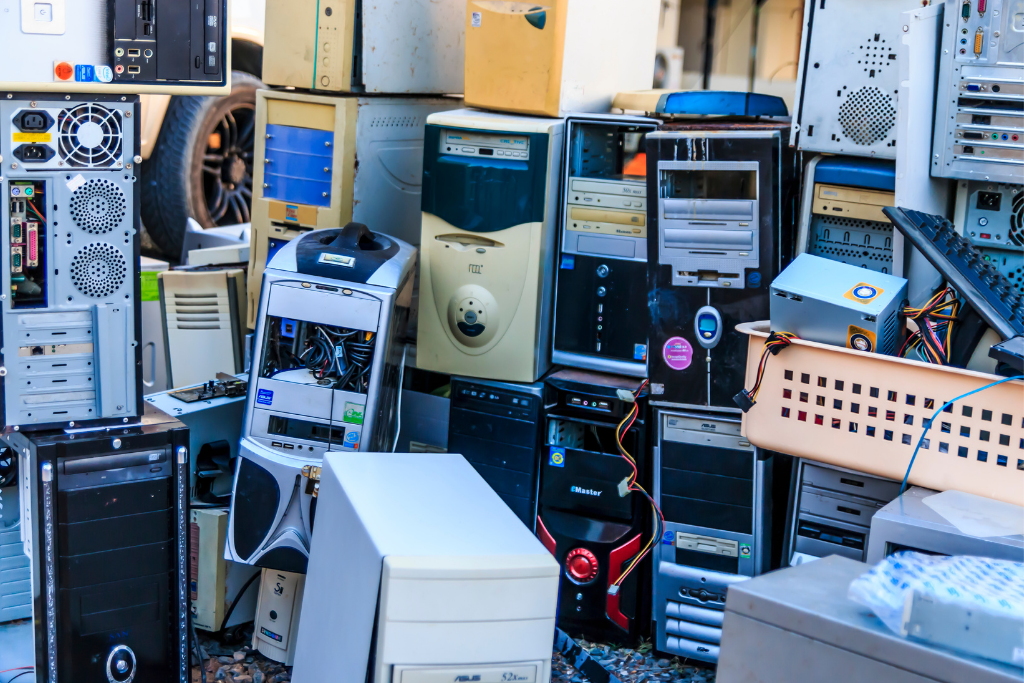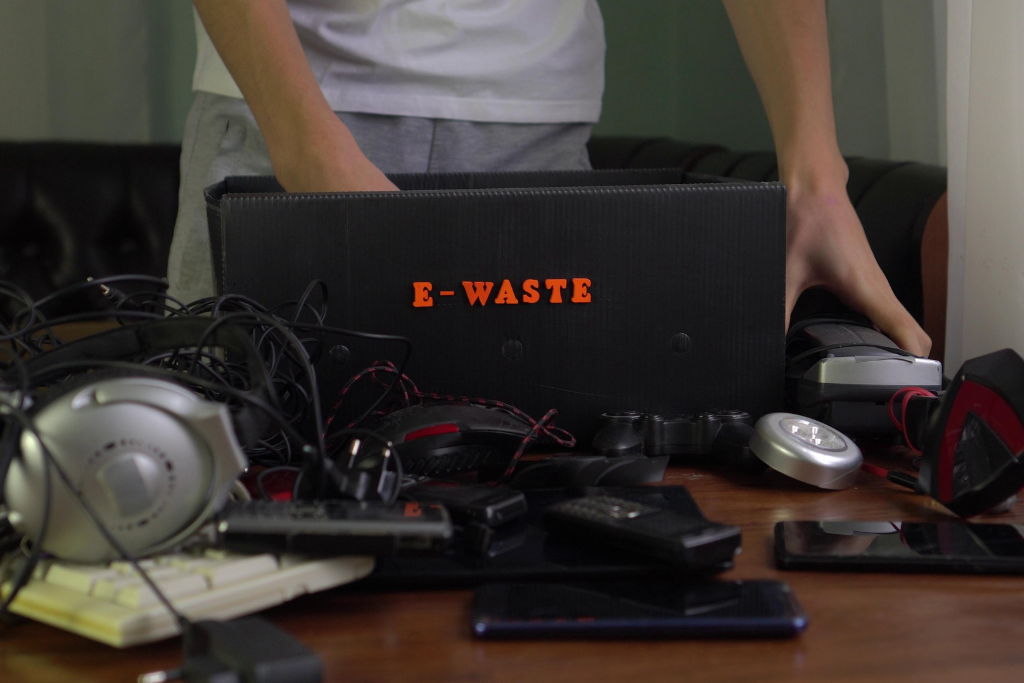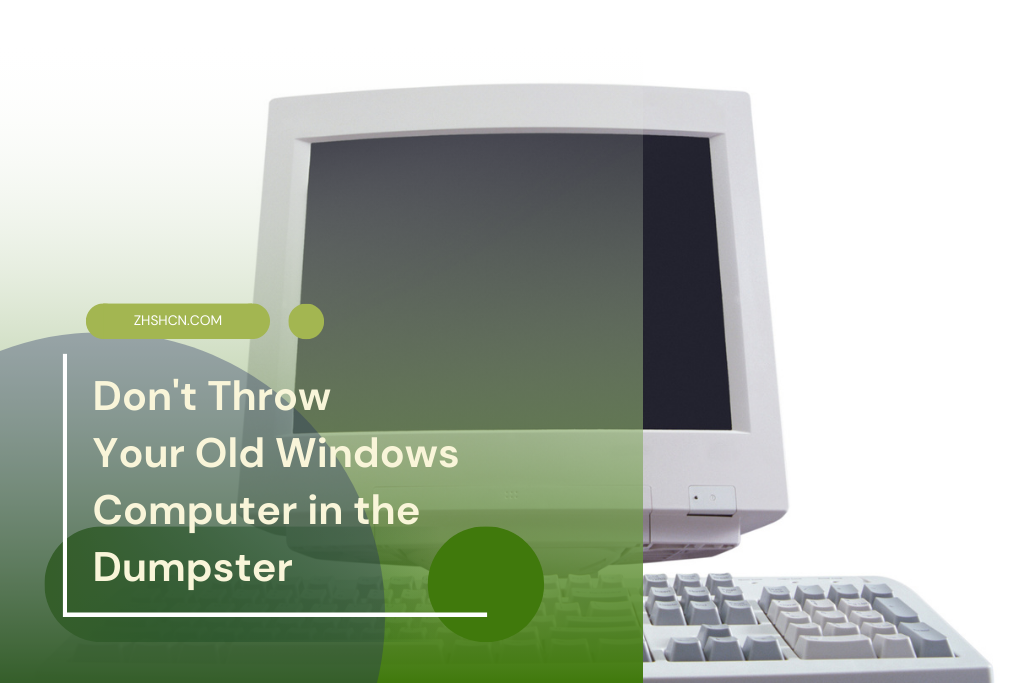Electronic waste is a growing concern in our fast-paced digital age. Don’t Throw Your Old Windows Computer in the Dumpster, nor your old Windows 7 or Windows 8 system. With some knowledge, you can give your aging technology a new life or ensure it’s disposed of responsibly.
Key Takeaways:
- Personal data can still be compromised even if you remove the hard drive from your computer.
- It’s crucial to erase data on the hard drive or ensure it’s unreadable before recycling.
- There are several responsible ways to handle old computers: selling, recycling, donating, or gifting.
- Keeping an old laptop as a backup is beneficial due to potential new laptop malfunctions.
- Recycling or donating aids in reducing e-waste by repurposing precious metals and plastics.
- Older computers can be rejuvenated by installing user-friendly Linux distributions like Ubuntu.
Why Recycling Electronics is Important
The Environmental Impact
Electronic waste, also known as e-waste, is a rapidly growing problem that poses a significant environmental threat. Disposing of electronic devices such as computers, smartphones, and other electronic gadgets in landfills can have disastrous consequences. These devices contain hazardous materials such as lead, mercury, and cadmium, which can contaminate soil and water, leading to serious health hazards.
However, recycling can help address this issue. When we recycle e-waste, we can recover valuable materials such as precious metals, copper, and plastic, which can be reused in various applications. This helps conserve our planet’s resources and reduces the environmental impact of mining and extracting these materials.
In addition, recycling e-waste can also have economic benefits. Recycling facilities create jobs and generate revenue by selling the recovered materials. It also reduces the cost of producing new products, making them more affordable for consumers. Therefore, recycling e-waste is an effective way to minimize the negative impact of electronic waste on our environment while also creating economic opportunities.
Data Security
💾🔒 Ensuring personal data protection is paramount. Simply removing the hard drive isn’t always enough. Before recycling, erase the data on your hard drive or consult a specialist recycler to prevent data breaches.
Table: Methods to Dispose of Your Old Laptop
| Method | Description |
|---|---|
| Sell | A thriving market exists for old tech; sell your laptop to someone in need. |
| Recycle | Contribute to reducing e-waste; some municipalities even schedule collection days. |
| Donate | Help those less fortunate by donating your usable device to them. |
| Gift | Pass on your old tech to a family member or friend. |
Giving Your Old Laptop New Life
Keeping as a Backup
🔐💻 Even if you’ve upgraded to a new laptop, your old one can be a valuable backup. Newer devices are not immune to technical issues or theft. Having an old laptop as a backup can be a lifesaver during emergencies.
Have you ever considered breathing new life into your old laptops or PCs by running Linux?
Using Linux for Rejuvenation
🐧 Have you ever considered breathing new life into your old laptops or PCs by running Linux? If not, you might miss out on a great opportunity to repurpose your old devices and extend their lifespan. One of the most user-friendly Linux distributions available is Ubuntu, which offers a vast software repository that eliminates the need for costly licenses.
🔄 By installing Ubuntu on an older machine, you’ll have access to a wide range of free software applications that you can use for various tasks, including office productivity, web browsing, multimedia playback, and more. While Ubuntu has an initial learning curve, it is a highly effective way to use old computers that might otherwise be sitting idle or collecting dust.
🐧 Moreover, using Ubuntu on older machines can help you save money in the long run by avoiding purchasing new hardware or software licenses. Additionally, it is an environmentally friendly approach to repurposing old devices and reducing electronic waste. So, if you have an older computer lying around that you're unsure what to do with, consider installing Ubuntu and giving it a new lease on life.
Safe and Responsible Ways to Dispose of Electronics
Proper and responsible disposal of electronic devices is increasingly critical to environmental protection. The electronic devices we use daily – from mobile phones and computers to printers and home appliances – all contribute to what’s known as electronic waste or e-waste. It’s crucial to understand that these devices don’t belong in our regular trash bins due to the hazardous materials they may contain. Elements like lead, mercury, and cadmium in e-waste can harm the environment and human health.
There are far safer and more responsible ways to eliminate obsolete or broken electronics. For example, numerous recycling programs are dedicated to handling electronic waste, providing an excellent option for disposal. Companies running these programs have the equipment and knowledge to safely extract, dispose of, and repurpose these hazardous materials. Another way to dispense with electronics responsibly is by donating or selling used devices. In doing so, the lifetime of these electronic items is extended, thereby reducing the demand for new products and consequently, lowering environmental impact.

Recycling Programs for Electronic Devices
As technology rapidly advances, so does the rate of electronic waste we generate. As consumers and businesses, we are responsible for using these devices optimally and properly, disposing of them when they have reached their end of life. Various recycling programs are available that serve as a sustainable solution to the problem of electronic waste accumulation.
These programs typically work by accepting old or obsolete electronic devices and then sourcing their components for reuse in other devices, reducing the overall amount of new materials needed in electronic manufacturing. The devices are often handled in a technologically advanced facility where they are safely disassembled, and valuable materials such as copper, gold, and other precious metals are extracted to be reused in new electronic devices. The residual waste materials are then properly disposed of, following environmentally friendly practices, thereby reducing the amount of e-waste going into landfills and curbing the harmful impact of electronic waste on our environment.
Donating or Selling Used Electronics
Donating or selling used electronics is an effective strategy for managing electronic waste. Extending the life cycle of these devices greatly contributes to the reduction of overall electronic waste. Numerous organizations benefit from donated electronic equipment including schools, charities, and less advantaged individuals. Therefore, before relegating your old electronics to the recycling bin, consider the potential second life for these devices and the potential for donation.
On the other hand, selling used electronics can also be beneficial. A vast marketplace for second-hand devices and computers offers consumers an affordable way to access technology. Moreover, it generates an income stream for the sellers. It’s important to ensure that the electronics are in good working condition and that any stored data has been properly deleted before they are sold to protect privacy. Of course, selling should only be considered when the electronic devices still have considerable life left. The sale of near-end-of-life devices can lead to irresponsible e-waste disposal methods, and that outcome should be avoided. This practice not only aids individuals and businesses in managing e-waste but also promotes a more sustainable use of technology.
How Businesses Can Manage Electronic Waste
Electronic waste, also known as e-waste, has become a pressing concern in the modern, technology-driven business landscape. The IT assets that firms utilize daily – such as computers, servers, printers, and mobile phones – have a finite lifespan. Once these devices end their useful life, they remain with residual value and more importantly, a plethora of potentially harmful materials. Businesses play a substantial role in managing this e-waste effectively, thus contributing to an environmentally-friendly atmosphere.
To manage their e-waste effectively, firms may partner with certified e-waste recycling agencies. These agencies are experts in disposing of electronic waste safely and environmentally responsible. Another avenue is implementing an internal electronics recycling program that encourages employees to responsibly dispose of their old and non-working devices within the organization. Companies could also organize periodic e-waste pickup drives, which would not only dispose of electronic waste properly but also promote a culture of sustainability among employees. These initiatives can underline a firm’s commitment to environmental sustainability, bolstering its corporate social responsibility profile.
The Role of Manufacturers in Electronic Waste Reduction
Manufacturers play a crucial role in implementing effective strategies to reduce the production of electronic waste. These firms are uniquely positioned to influence not only the lifecycle of their products but also their eventual disposal and potential recycling. By designing their electronic goods with recycling and longevity in mind, producers can drastically decrease the volume of electronic waste going to landfills. Moreover, by utilizing fewer harmful elements in their production processes, they can minimize the environmental impact of discarded devices.
Many manufacturers are now adopting advanced recycling programs and partnering with environmental organizations to refine their waste management methods. These partnerships often involve developing new disposal techniques and refining recycling processes, contributing significantly to reducing electronic waste. Implementing take-back programs, where companies reclaim their products at the end of their useful life, prevents these items from winding up in landfills. Thus, manufacturers’ aggressive e-waste reduction strategies are not just environmentally responsible; they also have socio-economic benefits, creating new jobs in the recycling industry.
Frequently Asked Questions
Is it safe to throw away a laptop after removing the hard drive?
No. When you remove a hard drive before recycling a computer, there’s a risk of your personal data being compromised unless you erase the data or ensure it’s unreadable. Consulting a specialist recycler like TechReset is advisable.
What should I do with an old laptop I no longer use?
You can sell, recycle, donate, or gift it. You might be surprised at the market for old tech. Municipalities often have collection days for recycling, or you can donate to someone in need. Learn more here.
Is there a reason to keep my old laptop?
Yes, especially if you heavily rely on a laptop daily. New laptops, despite their advancements, can malfunction or get stolen. Keeping your old laptop as a backup can be invaluable during such times. More details here.
What is the role of manufacturers in reducing electronic waste?
Manufacturers can significantly reduce electronic waste by designing products with recycling in mind, offering take-back programs, and using recycled materials. They are also responsible for educating consumers on proper product disposal methods.

What are some safe and responsible ways to dispose of electronics?
Safe and responsible ways to dispose of electronics include recycling them through certified e-waste recycling programs, donating or selling them for reuse, or returning them to the manufacturer if a take-back program is available.
Are there specific recycling programs for electronic devices?
Yes, there are numerous recycling programs specifically designed for electronics. These programs ensure that harmful materials found in electronics are disposed of responsibly and safely and that valuable materials are recovered and reused.
Is it possible to donate or sell used electronics?
Absolutely. Donating or selling used electronics is a great way to reduce electronic waste. This not only extends the life of the device but also keeps it out of the waste stream. However, it’s essential to erase all personal data before donating or selling your device.
How can businesses manage electronic waste?
Businesses can manage electronic waste by implementing responsible e-waste management policies. This could include recycling old equipment, donating or selling used electronics, or participating in manufacturer take-back programs. Businesses could also consider purchasing products designed with recycling in mind.
What is a manufacturer take-back program?
A manufacturer take-back program is where the manufacturer takes back the product once the consumer is done using it. The manufacturer then properly disposes of the product, often by recycling it, thus reducing electronic waste.
Why is reducing electronic waste important?
Reducing electronic waste is crucial due to the harmful materials in electronic devices, which can cause environmental and health problems if disposed of incorrectly. It also helps to conserve natural resources, as many of the materials used in electronics can be recovered and reused.
Understanding the importance of responsible electronic recycling can positively impact the environment and our data security. Whether repurposing, donating, or recycling, ensure you make an informed decision about your old tech.
